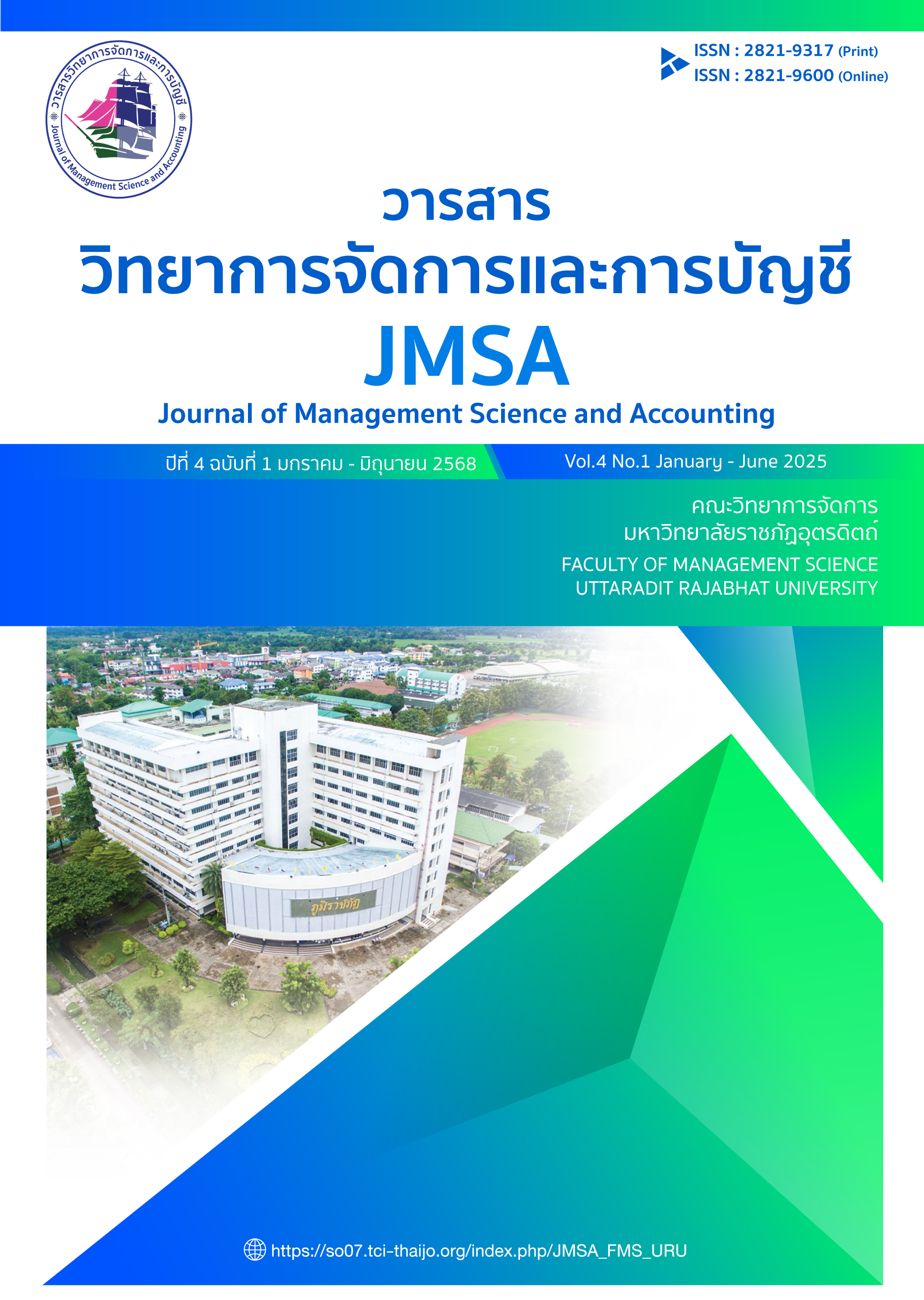ทัศนคติของผู้บริโภคและส่วนประสมทางการตลาดออนไลน์ที่มีอิทธิพลต่อกระบวนการตัดสินใจซื้อเสื้อผ้ามือสองผ่านแพลตฟอร์มออนไลน์ในประเทศไทย
Main Article Content
บทคัดย่อ
การวิจัยนี้มีวัตถุประสงค์เพื่อศึกษาทัศนคติและปัจจัยส่วนประสมทางการตลาด ออนไลน์ที่มีอิทธิพลต่อกระบวนการตัดสินใจซื้อเสื้อผ้ามือสองผ่านแพลตฟอร์มออนไลน์ในประเทศไทย เป็นงานวิจัยเชิงปริมาณ ประชากร คือ ผู้ใช้บริการที่เคยซื้อเสื้อผ้ามือสองผ่านแพลตฟอร์มออนไลน์ในประเทศไทย โดยใช้วิธีการสุ่มแบบสะดวก จำนวน 400 คน วิเคราะห์ข้อมูลโดยใช้สถิติ เชิงพรรณนา คือ ค่าความถี่ ค่าร้อยละ ค่าเฉลี่ย และส่วนเบี่ยงเบนมาตรฐาน สถิติเชิงอนุมาน ได้แก่ การวิเคราะห์ความถดถอยเชิงพหุคูณ ผลการวิจัยพบว่า 1) ปัจจัยด้านทัศนคติของผู้ใช้บริการที่ซื้อเสื้อผ้ามือสอง ค่าเฉลี่ยอยู่ในระดับมากที่สุดและเรียงลำดับจากมากไปน้อย ดังนี้ ด้านความเข้าใจ ด้านพฤติกรรม และด้านความรู้สึก ตามลำดับ 2) ปัจจัยส่วนประสมทางการตลาดออนไลน์ของผู้ใช้บริการที่ซื้อเสื้อผ้ามือสอง ค่าเฉลี่ยอยู่ในระดับมากที่สุดและเรียงลำดับจากมากไปน้อย ดังนี้ การส่งเสริมการตลาด การให้บริการส่วนบุคคลและการรักษาความเป็นส่วนตัว ราคาและช่องทางการจัดจำหน่าย และผลิตภัณฑ์ ตามลำดับ 3) กระบวนการตัดสินใจซื้อเสื้อผ้ามือสอง ค่าเฉลี่ยอยู่ในระดับมากที่สุดและ เรียงลำดับจากมากไปน้อย ดังนี้ การประเมินทางเลือก การตัดสินใจซื้อ การแสวงหาข้อมูลและพฤติกรรมภายหลังการซื้อ และการรับรู้ความต้องการ 4) ปัจจัยด้านทัศนคติที่ส่งผลต่อกระบวนการตัดสินใจซื้อเสื้อผ้ามือสองผ่านแพลตฟอร์มออนไลน์ พบว่า ด้านความเข้าใจ ด้านความรู้สึก ด้านพฤติกรรม ส่งผลต่อกระบวนการตัดสินใจซื้อเสื้อผ้ามือสองอย่างมีนัยสําคัญทางสถิติที่ระดับ 0.05 5) ส่วนประสมทางการตลาดออนไลน์ที่ส่งผลต่อกระบวนการตัดสินใจซื้อเสื้อผ้ามือสองผ่านแพลตฟอร์มออนไลน์ พบว่า ด้านผลิตภัณฑ์ ด้านราคา ด้านการส่งเสริมการตลาด ด้านการให้บริการส่วนบุคคล และด้านการรักษาความเป็นส่วนตัว ส่งผลต่อกระบวนการตัดสินใจซื้อเสื้อผ้ามือสองอย่างมีนัยสําคัญทางสถิติที่ระดับ 0.05
Article Details

อนุญาตภายใต้เงื่อนไข Creative Commons Attribution-NonCommercial-NoDerivatives 4.0 International License.
บทความที่ได้รับการตีพิมพ์ในวารสารวิทยาการจัดการและการบัญชี มหาวิทยาลัยราชภัฏอุตรดิตถ์ เป็นลิขสิทธิ์ของมหาวิทยาลัยราชภัฎอุตรดิตถ์
บทความที่ลงตีพิมพ์ใน วารสารวิทยาการจัดการและการบัญชี มหาวิทยาลัยราชภัฎอุตรดิตถ์ ถือว่าเป็นความเห็นส่วนตัวของผู้เขียน คณะบรรณาธิการไม่จำเป็นต้องเห็นด้วย ผู้เขียนต้องรับผิดชอบต่อบทความของตนเอง
ผู้เขียนที่ตีพิมพ์ ยอมรับเงื่อนไขต่อไปนี้:
- ผู้เขียนรักษาลิขสิทธิ์และให้สิทธิ์วารสารในการตีพิมพ์ครั้งแรกพร้อมกับผลงานที่ได้รับใบอนุญาตพร้อมกันภายใต้ Attribution-NonCommercial-NoDerivatives 4.0 International (CC BY-NC-ND 4.0) ที่อนุญาตให้ผู้อื่นแบ่งปันผลงานโดยรับทราบถึงผลงานของผู้เขียนและ การตีพิมพ์ครั้งแรกในวารสารนี้
- ผู้เขียนสามารถทำข้อตกลงเพิ่มเติมตามสัญญาแยกต่างหากสำหรับการเผยแพร่ผลงานฉบับตีพิมพ์ของวารสารแบบไม่ผูกขาด (เช่น โพสต์ลงในพื้นที่เก็บข้อมูลของสถาบันหรือตีพิมพ์ในหนังสือ) โดยรับทราบการตีพิมพ์ครั้งแรก ในวารสารนี้
- ผู้เขียนได้รับอนุญาตและสนับสนุนให้โพสต์ผลงานของตนทางออนไลน์ (เช่น ในคลังข้อมูลของสถาบันหรือบนเว็บไซต์) ก่อนและระหว่างขั้นตอนการส่งผลงาน เนื่องจากอาจนำไปสู่การแลกเปลี่ยนที่มีประสิทธิผล ตลอดจนการอ้างอิงงานที่ตีพิมพ์เร็วขึ้นและมากขึ้น
เอกสารอ้างอิง
Ajzen, I. (1991). The Theory of Planned Behavior. Organizational Behavior and Human Decision Processes, 50(2), 179-211.
Aphipornchaisakun, K. (2024). Internet usage behavior of Thai people. Retrieved June 25, 2024. From https://www.theprachakorn.com/newsDetail.php?id=907
Klin Suwan, A., & Yisunthet, W. (2021). Marketing mix factors affecting the behavior of buying plus-size women's clothing online. Journal of Science and Technology, Santapol University, 7(1), 121–127.
Best, J. W. (1977). Research in education (3rd ed.). Prentice-Hall.
Cochran, W. G. (1977). Sampling techniques (3rd ed.). Wiley. Department of International Trade Promotion. (2020). Online fashion business grows and is driven by attracting new consumer groups. https://www.ditp.go.th/ditp_web61/article_sub_view.php?filename=contents_attach/623154/623154.pdf&title=623154&cate=413&d=0
Economic Intelligence Center. (2023). Second-hand fashion connecting style with sustainability. https://url.in.th/DgVRJ
Kacha-at, K. (2021). Canvas business model selling women's fashion clothing through e-commerce of Generation Y group, Lana Store [Unpublished master’s independent study]. College of Management, Khon Kaen University.
Kotler, P., & Keller, K. L. (2016). Marketing management (15th ed.). Pearson.
Kotler, P., Keller, K. L., Ang, S. H., Tan, C. T., & Leong, S. M. (2018). Marketing management: An Asian perspective (7th ed.). Pearson Education Limited.
Luangjaru, S., & Phutachote, N. (2023). The clothes buying behavior through online platforms and the marketing mix factors of the decision making in purchasing clothes through online platforms. Journal of Modern Learning Development, 8(2), 1–18.
Muso, Y. (2020). Technology acceptance and online consumer behaviour affecting the intention to use Google Meet in online learning of Thai-Nippon Institute of Technology students [Unpublished master’s thesis]. Business and Industrial Management Innovation Program, Thai-Nippon Institute of Technology.
Rawireungrong, W. (2020). Brand image, attitude and commitment leading to purchase intention of Uniqlo brand clothing among consumers [Unpublished master’s thesis]. College of Management, Mahidol University.
Saksoong, N., & Mohprasit, N. (2023). Online marketing mix factors affecting consumers' purchasing decision via Shopee application in Muang Phayao District, Phayao Province. Journal of International Studies, Prince of Songkla University, 13(1), 255–284.
Schiffman, L. G., & Kanuk, L. L. (2007). Consumer behaviour (9th ed.). Pearson Education. Sharing Intelligence Center. (2024). Fast fashion: Will it be a success or a failure? https://n9.cl/0w33b
Thiansiri, P. (2022). Factors affecting the purchase intention of sustainable fast fashion clothing among consumers in Bangkok and its vicinity [Unpublished master’s thesis]. College of Management, Mahidol University.
Wanichbuncha, K., & Wanichbuncha, T. (2022). Statistics for research (34th ed.). Thammasarn Company Limited.


